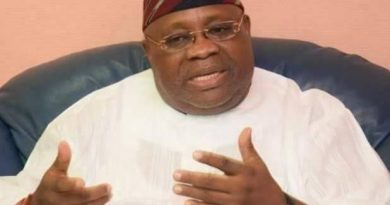Kwara’s Security Crisis and the Politics of Division
Kwara’s Security Crisis and the Politics of Division
By Bolaji Aladie
The recent surge in insecurity across Kwara State has highlighted the fragility of our collective safety and the urgent need for a unified front to address this growing concern. While the state government deserves commendation for its efforts to strengthen community policing and support security agencies, it is increasingly clear that these initiatives alone are insufficient. It is time for deeper collaboration between the executive and legislative branches of government, particularly between the Governor and Kwara’s federal lawmakers.
As the political leader of the state, the Governor bears the primary responsibility for coordinating responses to insecurity. However, he cannot tackle this issue in isolation. Beyond the executive actions taken at the state level, there exists an untapped resource: the legislative power of our federal representatives. If harnessed effectively, this power can amplify Kwara’s voice at the national level and attract much-needed attention and resources to our security challenges.
Unfortunately, the current political disunity in the state has hindered this necessary synergy. While our lawmakers are undoubtedly well-intentioned, they are working in parallel rather than converging on a common front. For instance, both Senator Arch. Lola Ashiru of the Red Chamber, and Hon. Ismahil Tijani of the House of Representatives have separately moved motions regarding the insecurity plaguing Kwara South. Their colleagues from other districts of the State have reportedly lent voices to these motions, which is commendable. Yet, one cannot help but wonder how much stronger and more impactful the message would have been if such motions were jointly sponsored by all Kwara federal legislators across both chambers, presenting a united response to a challenge that affects the entire state.
READ ALSO: Ex-FCTA Director, Duku Bags 24-Year Jail Term for ₦318m Fraud
Insecurity, by its very nature, knows no boundaries. What begins in one senatorial district can quickly spread to others, as we are witnessing right now. I speak dispassionately as a concerned Kwaran from Kwara Central, where the ripple effects of insecurity from both the North and South are increasingly being felt. The influx of displaced persons seeking refuge in Central is stretching our communities and resources. This is not a partisan issue; it is a human and developmental challenge requiring collective responsibility.
If the Governor were to convene a high-level meeting with all federal lawmakers from Kwara—regardless of their political parties—it could mark a turning point. Such a dialogue would provide a platform for them to discuss the security realities across all local government areas and craft a joint position paper or motion to be presented in both chambers of the National Assembly. This would not only demonstrate unity and political maturity but also send a message to the nation that Kwara’s leaders recognize that the fight for security transcends political affiliations.
Through collaboration, the Governor can leverage the lawmakers’ legislative powers of advocacy, appropriation, and oversight, while they, in turn, can benefit from the state’s intelligence and coordination mechanisms. Together, they can jointly lobby for more federal interventions—ranging from increased police cum Military presence and better funding for security forces to infrastructural support for border communities.
This approach would also inspire confidence among citizens, demonstrating that leadership in Kwara is driven by the needs of the people rather than individual egos. The reality is that insecurity thrives when leadership is divided. Our leaders must therefore look beyond party lines, their individual 2027 aspirations, and regional sentiments, whilst embracing a common agenda for Kwara.
Finally, I urge the public not to downplay or exaggerate the current situation for political reasons. The reality necessitates balanced, pragmatic action—rather than propaganda or denial. As citizens, we must encourage our leaders to collaborate, not to undermine them through partisan expectations.
Kwara has the opportunity to set a positive example for other states: a model where executive foresight meets legislative cooperation to deliver peace, stability, and development. The responsibility is shared—and the time for synergy is now.
Aladie, a concerned Kwaran, writes from FCT.




